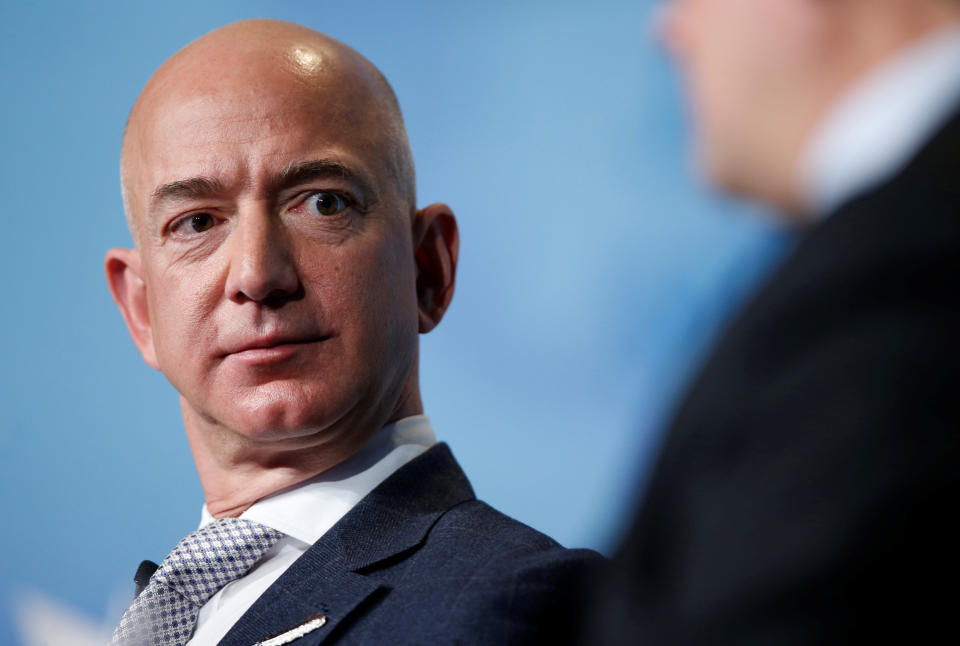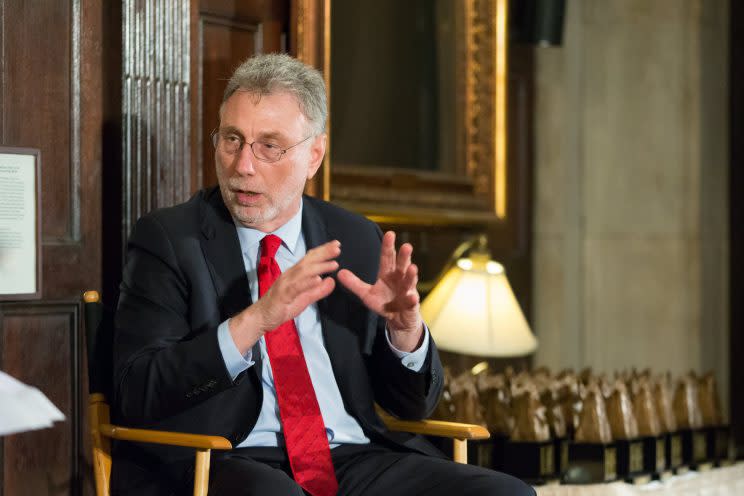Washington Post top editor: Bezos is a 'friendly' media billionaire
An interesting trend in journalism has emerged in the past few years: Billionaire benefactors have been stepping in to support an industry flummoxed by the question of how to make enough money to survive.
At the Deadline Club journalism awards in New York City Monday night, Washington Post editor Marty Baron was asked about how important journalism – the kind that can keep a check on power – can survive without needing to be supported by these “friendly” billionaires. Amazon (AMZN) founder and CEO Jeff Bezos bought The Washington Post in 2013 for $250 million and has a close relationship with the media organization.
“Well, they’re not all so friendly,” said Baron, when asked about this phenomenon. “Ours is friendly. I don’t know I have an answer to that question. With respect to us, I think it’s important to recognize that we’re not being treated like a charity.”
Although new and sometimes exciting non-billionaire-led publishing is being introduced, often with venture capital, much of it has been geared toward newer trends of non-news “content” (think lifestyle publications and articles like “The only guacamole recipe Anthony Bourdain will eat”), which is cheap to produce, more shareable, and delivers more tailored ad dollar potential than generalist journalism.

Bezos has plenty of billionaire company in the news industry: EBay (EBAY) founder Pierre Omidyar funds the Intercept (Glenn Greenwald is co-founding editor). Rupert Murdoch owns News Corp (NWSA). Michael Bloomberg owns Bloomberg. John Henry owns the Boston Globe. Sheldon Adelson, casino magnate and CEO of Las Vegas Sands (LVS), owns the Las Vegas Review-Journal. Morningstar’s (MORN) founder Joe Mansueto owns Inc. and Fast Company. Mortimer Zuckerman owns U.S. News and the New York Daily News. Carlos Slim has a big stake in the New York Times, and healthcare billionaire Patrick Soon-Shiong has one in the Tronc. Russian oligarch Alexander Lebedev owns the Independent—though he may not be a billionaire anymore.
On Tuesday evening, Reporters Committee for Freedom of the Press, which provides legal assistance to journalists, announced that Jeff Bezos made a $1 million donation.
“Jeff’s purpose is to create a sustainable business model for the Washington Post,” said Baron. “If it were treated as a charity and he got tired of that charity someday we would be in deep trouble. Last year was our first profitable year in a number of years and we are having a better year this year.”
In Baron’s view, the real challenge isn’t with national news organizations, which he says are beginning to find a sustainable business model. Larger national publications like the New York Times, Washington Post, and the Wall Street Journal have enjoyed a “Trump bump” as subscriptions have surged as the public thirsts for scoops on details of the new presidency. Smaller organizations, as the Washingtonian noted recently, aren’t included in this to the same degree.

Baron echoed this point, indicating that the issue is making the business model work for cities like Boston, Miami, and Los Angeles, which face online competition in a way smaller local papers do not.
“The major metros have a huge business challenge in places I worked whether it’s Boston or Miami or Los Angeles—places like that,” said Baron. “I’m not sure we’ve figured out what that model is.” However, Baron did note progress for papers in Dallas and Minneapolis, and the contributions of public radio stations and nonprofits like Texas Tribune.
Still, Baron said these journalism outlets are going to have to figure things out for themselves, and that their business model challenge is more “difficult than anybody else’s.” Without a Bezos-type benefactor, Baron says “that business model is TBD for sure.”
Ethan Wolff-Mann is a writer at Yahoo Finance focusing on consumer issues, tech, and personal finance. Follow him on Twitter @ewolffmann. Got a tip? Send it to tips@yahoo-inc.com.
Read more:
Airlines are giving crews leeway to hand out money when necessary
Banks take just 90 seconds to approve a credit card. Here’s what they look for.
Uber’s new tipping dilemma: low prices or smooth experience
Zuckerberg at Facebook conference: if you take one thing away—this is it
The cost of unifying North and South Korea
The trick to getting credit card fees waived? Just ask
Chase’s Sapphire Reserve is very worth it, even with its slashed bonus

